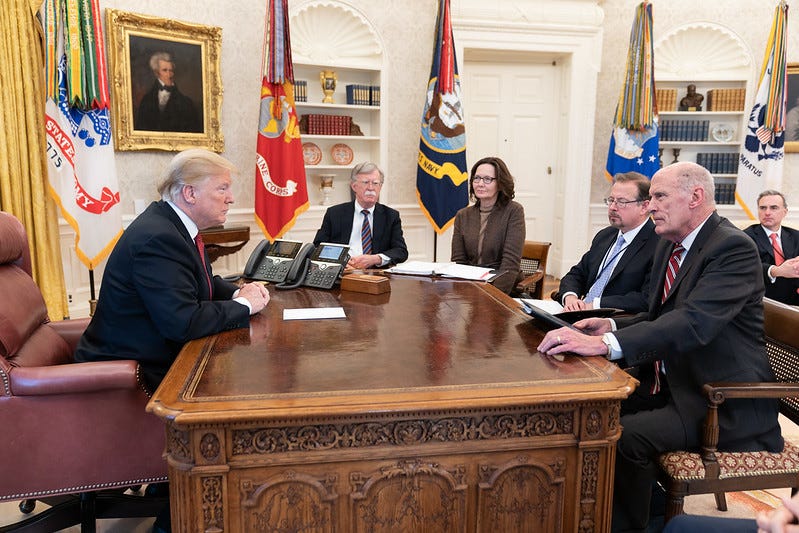President Donald J. Trump meeting with first term officials including National Security Adviser Ambassador John Bolton; Director of the Central Intelligence Agency Gina Haspel and Director of National Intelligence Dan Coats, right, in the Oval Office at the White House on Thursday, 31 January 2019 (Trump White House Archived, Flickr; public domain).
The Secret Service is not one of the 18 agencies that officially make up the US intelligence community. Its inability to prevent an assassination attempt against former President Trump on Saturday may nevertheless fuel the antagonism that has characterised Trump’s relationship with the intelligence world.
Those tensions were already on display last week when Politico reported that Trump intends to cut back intelligence sharing with NATO allies in a second term. Former CIA director John Brennan warned that any such move ‘would have an immediate, profound, and potentially long lasting adverse impact on Western security interests.’1
Such cuts would be of particular concern to Britain given the deep relationship between British and US intelligence agencies, particularly the NSA and GCHQ. That very closeness has sometimes drawn Britain into domestic American struggles.
Former GCHQ chief Robert Hannigan is reported to have briefed Brennan on communications between Trump’s team and Moscow in 2016. Around the same time, former MI6 officer Christopher Steele was trying to interest the FBI in his dossier alleging collusion between Russia and Trump’s campaign team.2
The FBI’s subsequent investigation of the Russia allegations contributed to Trump’s decision to fire the bureau’s director, James Comey, in 2017.3 The intelligence community’s conclusion that Russia had interfered in the 2016 election also caused tensions with Director of National Intelligence Dan Coats, who was fired in 2019.4 His replacement, John Ratcliffe, later released a Russian assessment about the Hilary Clinton campaign that the Senate Intelligence Committee characterised as disinformation.5
Another unit involved in investigating Russian interference, the CIA Counterintelligence Center, was told to report directly to Director Mike Pompeo, a Trump political appointee.6 Pompeo’s deputy and successor, Gina Haspel, was a career intelligence officer who sought to protect the agency by taking a low key approach. As a former London station chief, she was credited with shoring up the relationship with Britain.7 However, former National Security Adviser John Bolton claimed that Trump routinely chastised Haspel and DNI Coats during intelligence briefings.8
Bolton is among many who anticipate a major overhaul in the intelligence community in the event of a Trump second term, subordinating career professionals to political loyalists expected to serve a partisan domestic agenda.9
FBI director Christopher Wray is a Trump appointee who still has much of his 10-year term to run. Yet he has not been immune from Trump’s criticism of the bureau, which is seen as the agency likely to be under most pressure, according to Politico.10
First term veterans including Ratcliffe, Pompeo and former acting DNI Ric Grenell are among those who could return to leading positions, and a number of Republican legislators have been touted as possible agency chiefs.
Senator Marco Rubio, the vice-chair of the Senate intelligence Committee, is in the running to head the CIA, according to Semafor.11 That may cause concern among some European Governments given his remarks about the need for a negotiated settlement in Ukraine earlier this year.12 Another contender is Kash Patel, a former NSC adviser and prominent critic of the Trump-Russia investigation.13
Politicised appointments and unchecked executive authority are not new concerns in relation to the US intelligence community. For much of the post-war period, a growing intelligence apparatus was seen as key factor in the rise of the ‘imperial presidency.’ The emergence of Congressional oversight in the 1970s allowed the community to gain a degree of autonomy by playing off different branches of the government.
The ill-fated tenure of Max Hugel as CIA Director of Operations in the early 1980s showed the extent to which intelligence professionals could fight back against unwelcome political appointees.
Nevertheless, the wider American government has always appeared, to British eyes at least, as an unreconstructed spoils system. European concern about Trump’s appointees is likely to focus most on the policy his intelligence community is tasked with supporting.
Great pressure over the burden of support for Ukraine would be an inevitability in a second Trump administration. Beyond that European fears are likely to focus on unilateral US pressure on Ukraine, and a potential weakening of the Article 5 guarantees that underpin the NATO alliance.
Erin Banco, Trump considering cutting back intel sharing with Europe, officials warn, Politico, 10 July 2024.
Jane Mayer, Christopher Steele: The Man behind the Trump Dossier, 12 March 2018 issue, New Yorker. Archived at the Internet Archive.
David Smith, Julian Borger and Lauren Gambino, Donald Trump admits 'this Russia thing' part of reasoning for firing Comey, Guardian, 12 May 2017.
Alex Ward, Trump says Daniel Coats, director of national intelligence, to step down, Vox, 28 July 2019.
Andrew Desiderio and Daniel Lippman, Intel chief releases Russian disinfo on Hillary Clinton that was rejected by bipartisan Senate panel, Politico, 29 September 2020.
Greg Miller, At CIA, a watchful eye on Mike Pompeo, the president’s ardent ally, Washington Post, 24 August 2017.
Shane Harris, The quiet director: How Gina Haspel manages the CIA’s volatile relationship with Trump, Washington Post, 30 July 2019.
Erin Banco and John Sakellariadis, The prospect of a second Trump presidency has the intelligence community on edge, Politico, 26 February 2024.
Dan De Luce, If Trump wins, he could weaponize U.S. spy services against his domestic political enemies, former intel officers warn, NBC News, 3 June 2024.
Erin Banco and John Sakellariadis, The prospect of a second Trump presidency has the intelligence community on edge, Politico, 26 February 2024.
Jay Solomon, The senators who could fill Trump’s national security cabinet, Semafor, 19 March 2024.
Miranda Nazzaro, Rubio says ‘there’s no way’ Russia takes all of Ukraine, The Hill, 3 March 2024.
Mike Allen, Jim VandeHei, Behind the Curtain — Exclusive: How Trump would build his loyalty-first Cabinet, Axios, 7 December 2023.




